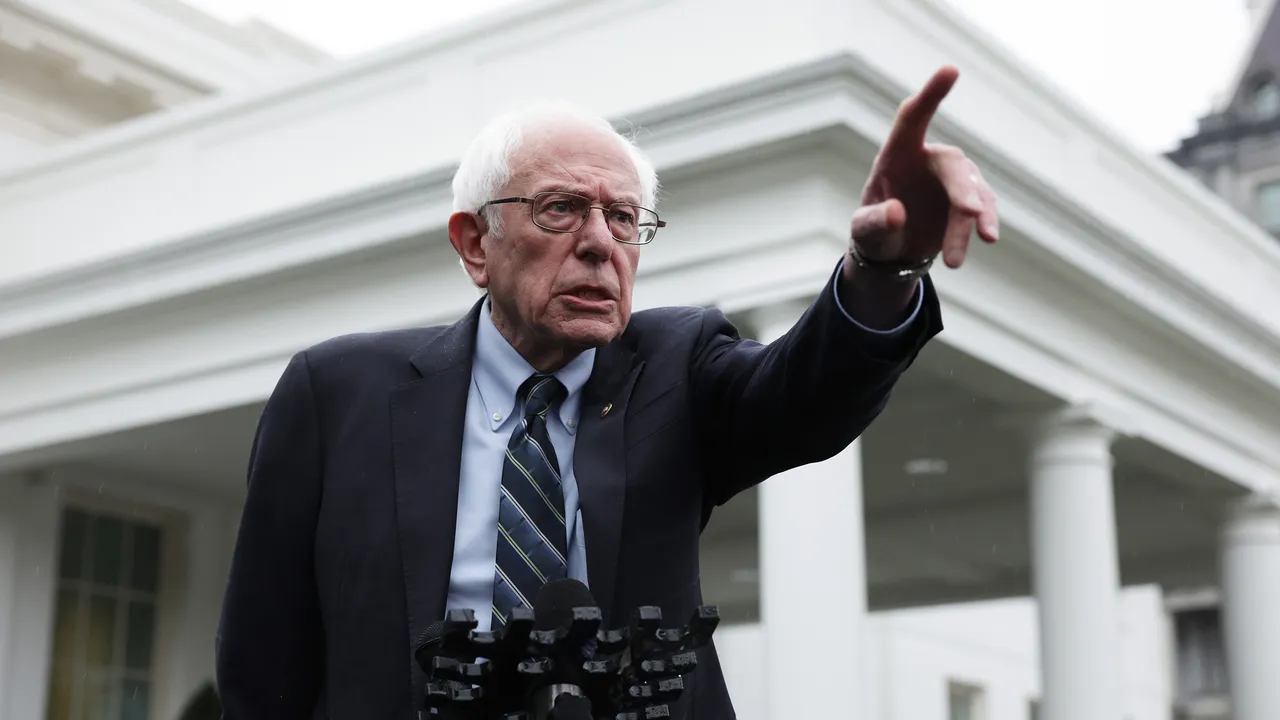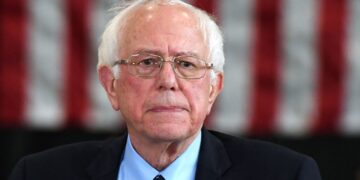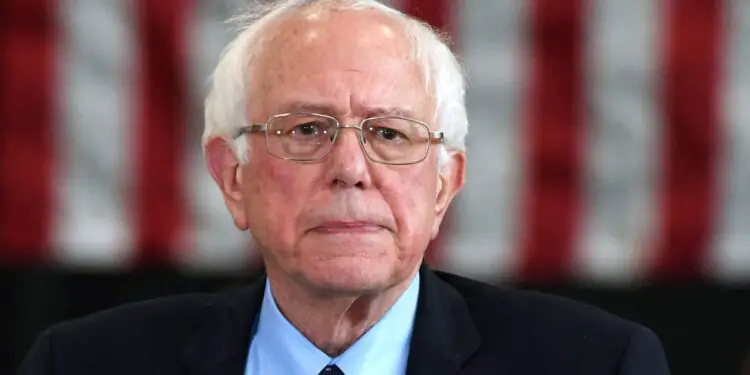Bernie Sanders, born on September 8, 1941, has been a vocal critic of contemporary neoliberal capitalism, attributing societal issues like declining life expectancy and rising diseases of despair to its influence.
His political platform is heavily influenced by the Nordic model, advocating for tax-funded social benefits and progressive policies to address income inequality and support the working class.
Sanders’ commitment to social justice and economic equality has garnered him a dedicated following, particularly among younger voters who resonate with his calls for systemic change.
Throughout his political career, Sanders has been recognized for his legislative effectiveness, earning the nickname ‘amendment king’ for his success in passing amendments in Congress.
He has consistently championed issues affecting the middle class and has been a strong advocate for policies that aim to bridge the wealth gap in the United States.
Sanders’ dedication to his principles and his unwavering commitment to fighting for the rights of all Americans have solidified his position as a key figure in progressive politics, shaping the discourse on important social and economic issues in the country.
| Net worth | $2.5 million to $3 million |
| Profession | Politician |
| Date of birth | September 8, 1941 |
| Nationality | American |
Background
Sanders’ father, Eli, was born in Slopnice, Poland and immigrated to the United States in 1921 at age 17 to escape poverty and anti-Semitism.
Dorothy Glassberg Sanders, the politician’s mother, was born in New York City to Jewish immigrant parents from Poland and Russia.
The family lived in a rent-controlled apartment in Brooklyn, where Sanders’ father worked as a paint salesman to support the family.
His parents instilled in him values of hard work and public service.
Dorothy passed away at a young age due to health issues, and Eli died two years later.
Sanders’ older brother, Larry, was a significant influence on his political views.
Larry, a social worker and politician, highlighted the impact of Hitler’s rise and the positive influence of Franklin Delano Roosevelt’s presidency on their political beliefs.
Sanders’ upbringing in Brooklyn, marked by financial struggles and the loss of his mother at a young age, significantly shaped his views on healthcare, income inequality and the importance of public service.
Net worth
Sanders’ net worth varies slightly across sources but generally falls between $2.5 million and $3 million.
His wealth primarily stems from his Senate salary, book royalties, real estate holdings and investments.
Despite being a millionaire, Sanders’ net worth is relatively modest compared to many other members of Congress, with some having net worths exceeding $100 million.
His financial success has been attributed to his long career in politics, book sales and prudent financial management, including owning multiple properties and investing in retirement accounts.
Income
Sanders accumulated his net worth primarily through book advances and royalties, with a significant increase in income after publishing the book, Our Revolution, in 2016.
Between 2009 and 2018, he earned $4.7 million, with a substantial portion coming from book earnings.
Sanders combined adjusted gross income with his wife was $561,000 in 2018, following a peak in book earnings in 2016 and 2017.
Additionally, as a U.S. Senator, he earns a salary of $174,000 per year.
Apart from book earnings, Sanders and his wife own real estate properties, including a primary home in Vermont, a townhouse in Washington, D.C. and a vacation home on Lake Champlain.
His investments and retirement funds are modest, with a pension from his time as the mayor of Burlington, Vermont and joint bank accounts with balances ranging from $15,001 to $250,000.
Our Revolution book sales
Sanders made $795,000 from the advance for his book, Our Revolution, and an additional $70,484 in royalties in 2016.
In 2017, the book royalties added up to $880,091.14 and in 2018, they were $392,810.37.
The book delves into his experiences during his historic presidential campaign in 2016.
Initially considered a long shot, Sanders’s campaign gained significant traction, receiving over 13 million votes and winning 22 states.
The book not only recounts the details of his primary fight but also emphasizes the importance of challenging corporate greed and advocating for social justice.
Sanders outlines a progressive agenda focusing on economic, environmental, racial and social justice issues, aiming to transform the country for the better.
Our Revolution serves as a call to action for those looking to continue the political revolution sparked by Sanders, highlighting the ongoing struggle for change and reform in American politics
Early career
Sanders attended Brooklyn College for a year before transferring to the University of Chicago, where he joined the Young People’s Socialist League and was active in the civil rights movement.
He participated in the 1963 March on Washington for Jobs and Freedom and was fined for resisting arrest during a demonstration against segregation in Chicago’s public schools.
Sanders also opposed the Vietnam War and applied for conscientious objector status, but his application was denied.
After graduating from the University of Chicago, he returned to New York City as a Head Start teacher, psychiatric aide and carpenter.
In 1968, Sanders moved to Vermont, where he worked as a filmmaker and writer, creating and selling “radical film strips” and other educational materials to schools.
He also wrote articles for the alternative publication The Vermont Freeman.

Political career
Sanders began his political journey by serving as the mayor of Burlington, Vermont, from 1981 to 1989.
He then transitioned to the U.S. House of Representatives, where he served from 1991 to 2007.
Sanders was elected to represent Vermont in the U.S. Senate in 2006 and has continued in this role since then.
Throughout his career, he has been known for his progressive stance on various issues, including income inequality, health care, climate change and veterans’ affairs.
Sanders, a self-described democratic socialist, has been a vocal advocate for policies aimed at addressing income and wealth disparities in the United States.
He has championed initiatives such as tax reform, universal health care, free tuition at public universities and stricter regulations on Wall Street.
Sanders’ political platform has resonated with many voters, particularly younger Democrats, due to his emphasis on social welfare and economic justice.
Moreover, he has been recognized for his legislative achievements, such as passing significant reforms in the VA health care system and playing a key role in bridging partisan divides in Congress.
Sanders’ tenure as a senator has seen him chairing the Senate Committee on Veterans’ Affairs and being appointed as the chairman of the Senate Health, Education, Labor and Pensions (HELP) Committee.
Additionally, he has been active on committees focusing on environmental issues, budget, and energy transformation.
U.S. House of Representatives
Sanders served in the U.S. House of Representatives for 16 years, from 1991 to 2007, before being elected to the U.S. Senate in 2006.
His time in the House of Representatives makes him the longest serving independent member of Congress in American history.
Sanders was born in Brooklyn, New York, in 1941 and attended James Madison High School, Brooklyn College and the University of Chicago, where he earned a B.A. in political science in 1964.
After graduating, he moved to Vermont and began his political career in 1971 when he joined the anti-Vietnam War Liberty Union Party (LU) in Vermont.
Sanders ran unsuccessfully for a seat in the U.S. Senate and in 1979 eventually resigned from the LU and began working as a writer and producer of the American People’s History Television Show.
In 1981, he was elected as mayor of Burlington, the state’s largest city, by a mere 10 votes, and served as mayor until 1989.
During his mayoral tenure, Sanders made major strides in affordable housing, progressive taxation, environmental protection, child care, women’s rights, youth programs and the arts.
In 1988, he ran as an Independent for a vacant seat in the U.S. House of Representatives but placed second to Republican Peter Smith.
In 1990, Sanders ran again and this time defeated the incumbent and became the first Independent elected to Congress in 40 years.
Sanders was reelected seven times, making him the longest-serving Independent in the history of the House of Representatives.
Senate
Sanders transitioned to the Senate from the U.S. House of Representatives in 2007, becoming the third senator from Vermont to caucus with the Democrats.
His caucusing with the Democrats gave them a 51-49 majority in the Senate during the 110th Congress in 2007-08.
Sanders is a member of the Congressional Progressive Caucus, the Democratic Caucus of the United States Senate and the United States Senate Afterschool Caucus.
He has consistently ranked among the most popular U.S. senators, with approval ratings reaching as high as 83% among his constituents in 2015.
Sanders has been an influential figure in the Democratic Party, particularly in advocating for progressive policies.
He has been a vocal critic of income inequality, corporate greed, and the influence of money in politics.
Sanders has also been a strong advocate for universal healthcare, free college education, and addressing climate change.
During the 2008 and 2012 presidential elections, he did not run for president and endorsed then-Senator Barack Obama in 2008 and then-Senator Hillary Clinton in 2012.
However, in 2016, Sanders ran for the Democratic Party’s nomination for president, challenging Hillary Clinton for the nomination.
He ran a strong campaign, winning 23 primaries and caucuses and garnering over 13 million votes.
However, Clinton ultimately won the nomination, and Sanders endorsed her in the general election.
Sanders’ 2016 presidential campaign was notable for his focus on progressive policies, such as Medicare-for-all, free college tuition, and a chastening of the nation’s financial elite.
His campaign also helped to elevate the voices of progressive activists and organizations, such as the Democratic Socialists of America and the Sunrise Movement.
After his 2016 presidential campaign, Sanders returned to the Senate, where he has continued to advocate for progressive policies.
In 2023, he became the Chair of the powerful Senate Health, Education, Labor, and Pensions Committee, where he has focused on achieving tangible movement on major health care, educational reform, labor reform and pension reform.
Sanders has also been critical of the Biden administration’s approach to prescription drug pricing, announcing earlier this summer that he would put a hold on certain nominees until the White House announced a plan to make progress on the issue.
In recent years, he has also introduced legislation to enact a 32-hour workweek with no loss in pay, arguing that the financial gains from advancements in artificial intelligence, automation and new technology should benefit the working class, not just corporate CEOs and wealthy stockholders on Wall Street.
Sanders has also been a strong advocate for raising the minimum wage, introducing legislation to lift the minimum wage to $17 an hour in 2018, although the panel has yet to move this year.
Real estate
Sanders owns three houses. The first is a $405,000 upgrade to a four-bedroom house in Burlington, Vermont, purchased in 2009 with a mortgage of $324,000.
The second is a $175,500 house on Killarney Drive, also in Burlington, purchased in 1989 with a mortgage of $140,000.
The third is a $575,000 lakefront home in North Hero, Vermont, purchased in 2016 with cash.
Sanders has also earned over $1 million annually in recent years, with $885,767 of his 2017 income coming from cash advances and royalties from his book, Our Revolution.
Despite his wealth, he has been a vocal critic of income inequality and has advocated for higher taxes on the rich.
Sanders has also been an advocate for affordable housing and has proposed measures to increase federal programs to help Americans buy homes and combat housing discrimination.
Personal life
Sanders has a total of four children and seven grandchildren.
His only biological child is Levi Sanders, who was born in 1969 to then-girlfriend Susan Campbell Mott.
Sanders also has three step-children from his current marriage with Jane Sanders, namely Dave Driscoll, Carina Driscoll and Heather Titus.
These three children were adopted by Bernie Sanders after he married Jane Sanders.
Sanders’s son, Levi Sanders, has three children of his own, making Sanders a grandfather to seven grandchildren.
Jane has also served as the first lady of Burlington, Vermont, during her husband’s term as mayor, and has been instrumental in founding The Sanders Institute, a progressive think tank.
























